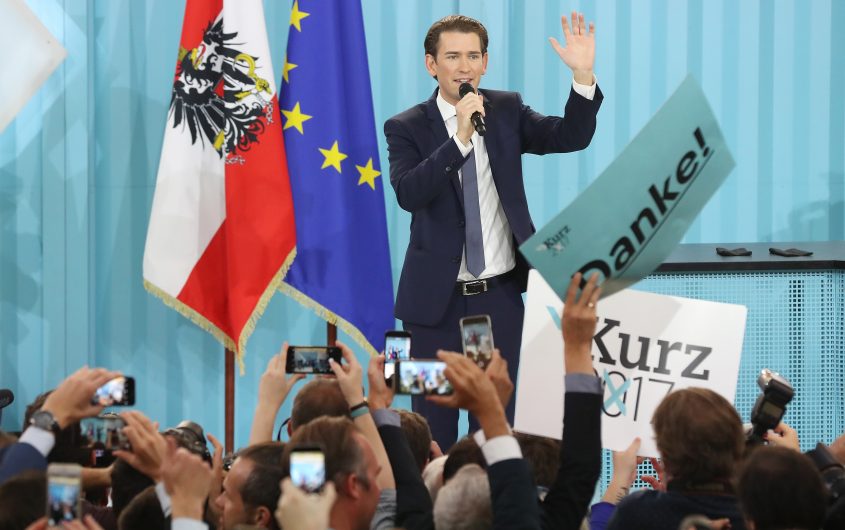
Sean Gallup/Getty Images
Austria, Europe’s un-Bellwether Nation

Peter S. Rashish
Vice President; Director, Geoeconomics Program
Peter S. Rashish, who counts over 30 years of experience counseling corporations, think tanks, foundations, and international organizations on transatlantic trade and economic strategy, is Vice President and Director of the Geoeconomics Program at AICGS. He also writes The Wider Atlantic blog.
Mr. Rashish has served as Vice President for Europe and Eurasia at the U.S. Chamber of Commerce, where he spearheaded the Chamber’s advocacy ahead of the launch of the Transatlantic Trade and Investment Partnership. Previously, Mr. Rashish was a Senior Advisor for Europe at McLarty Associates, Executive Vice President of the European Institute, and a staff member and consultant at the International Energy Agency, the World Bank, UN Trade and Development, the Atlantic Council, the Bertelsmann Foundation, and the German Marshall Fund.
Mr. Rashish has testified before the House Financial Services Subcommittee on International Monetary Policy and Trade and the House Foreign Affairs Subcommittee on Europe and Eurasia and has advised three U.S. presidential campaigns. He has been a featured speaker at the Munich Security Conference, the Aspen Ideas Festival, and the European Forum Alpbach and is a member of the Board of Directors of the Jean Monnet Institute in Paris and a Senior Advisor to the European Policy Centre in Brussels. His commentaries have been published in The New York Times, the Financial Times, The Wall Street Journal, Foreign Policy, and The National Interest, and he has appeared on PBS, CNBC, CNN, NPR, and the BBC.
He earned a BA from Harvard College and an MPhil in international relations from Oxford University. He speaks French, German, Italian, and Spanish.
For many years, the state of Maine was a reliable indicator of the U.S. political mood. So much so that the phrase “As Maine goes, so goes the nation” gained currency. Maine’s career as a political bellwether came to a crashing end in 1936, when Republican Alf Landon carried only two New England states. That led FDR’s campaign manager that year to declare, “As Maine goes, so goes Vermont.”
Ahead of yesterday’s national elections in Austria, many observers were inclined to see the country as a bellwether for Europe the way Maine was for the United States pre-1936. Here was a wealthy, stable country in the center of Europe that nonetheless had a resurgent far-right, a mainstream conservative party that jumped ahead by adopting hardline positions on immigration, and long-dominant Social Democrats lagging in the polls. As Austria goes (rightward), so goes Europe?
While it may be true that because of its historical role as a Central European crossroads, Austria can sometimes punch above its diplomatic weight, it is important to understand how distinct its domestic political culture is and so not to over-interpret what Sunday’s results mean for the other twenty-seven members of the European Union.
Not only has Austria’s far-right Freedom Party (FPÖ) been a feature of the political landscape since the end of four-power occupation in 1955, but for the last thirty years it has consistently been one of the three largest parties represented in parliament. And from 2000-2006 it was even the junior partner in government with the conservative People’s Party (ÖVP)—the political constellation most likely to rule Austria again after this election. The Freedom Party had a historically strong showing yesterday of 26 percent, but not as strong as in 1999 when it gained just shy of 27 percent of the vote.
And why has a far-right party been able to capture so many votes so regularly in Austria? The answer to that question points to another peculiarity of Austria’s political culture. More than in any other country in Europe, the two historically-dominant parties—the center-right People’s Party and the center-left Social Democrats (SPÖ)—have long carved up the civil service, state-owned companies, and other institutions between them.
That guaranteed a certain stability, but also opened up the field to the Freedom Party, which could claim it was for the little guy against a rigged system. A classic protest party, the last time it was in government it proved (unsurprisingly) to have few if any workable political ideas and saw its support drop by more than half in the following election. It took nearly twenty years for it to get close to its previous high watermark of support among the electorate.
This time around, on the one issue where the Freedom Party is in sync with a trend in the national and broader European mood—immigration—the People’s Party candidate, foreign minister Sebastian Kurz, campaigned on a restrictive platform. This does not mean Kurz is a right-wing populist, but he has moved the People’s Party to the right so that it now resembles the Bavarian Christian Social Union, the sister party of Chancellor Merkel’s Christian Democratic Union, more than it does the CDU itself.
Would a coalition of a somewhat more right-wing People’s Party and the far-right Freedom Party have any real consequences for the future direction of the European Union? Austria’s president, Alexander Van der Bellen, narrowly beat his Freedom Party opponent last year by running as an independent “left-liberal,” which in European parlance means someone who espouses an open society and progressive social values.
But Van der Bellen also won by reminding Austrians how dependent their country’s prosperity is on its deep integration in the EU. Not only is Van der Bellen thought unlikely to allow the Freedom Party to run the foreign ministry, which is responsible for European affairs. But a future Chancellor Kurz will know that, when forced to choose, a majority of Austrians opt for the most pro-European candidate. He is unlikely to end up on the wrong side of that divide.








